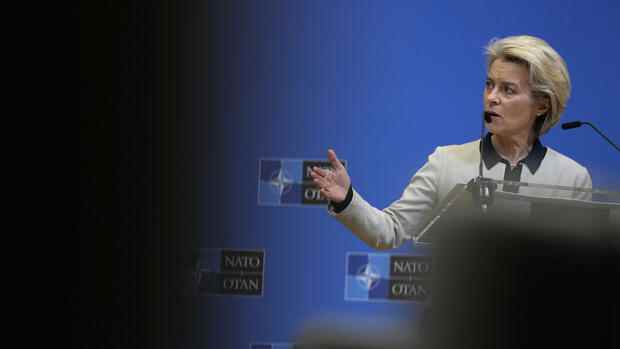Brussels As a reaction to the Russian war of aggression against Ukraine, the EU wants to adopt a new package of sanctions immediately. “With this package, we will target strategic sectors of the Russian economy by blocking their access to technologies and markets that are key to Russia,” Commission President Ursula von der Leyen said.
Financial sanctions “will raise the cost of borrowing, raise inflation, increase capital outflows and gradually erode the country’s industrial base,” she later clarified.
In addition, sanctions against Russian industry are planned: “Our measures will weaken Russia’s technological position in key areas where the elite make most of their money. That ranges from high-tech components to the latest software,” says von der Leyen.
The financial sector, industry, the energy sector and the transport sector are to be affected. The EU ambassadors approved the measures at an emergency meeting on Thursday morning. This clears the way for the European heads of state and government to adopt the package. They want to come together in the evening for a summit convened at short notice in Brussels.
Top jobs of the day
Find the best jobs now and
be notified by email.
“The Russian people are not the enemy. The sanctions are aimed at those who have an influence on the Kremlin’s aggressive policies,” stressed an EU diplomat.
The actions of the Europeans are closely coordinated with the Americans. Among other things, the package provides for export barriers for microchips – tiny components that are required for practically all modern goods. This would deprive Russian industry of the opportunity to develop further.
First time sanctions package deployed
It would be the first time that Europe uses such an instrument. The Americans, on the other hand, already have experience with it. With a chip embargo, they managed to massively damage the Chinese tech group Huawei, which Washington identified as a security threat. The case also shows China’s inability to produce equivalent chips, and thus its ability to help Russia would be limited.
At the same time, Russian banks are to be cut off from Western capital – including the country’s largest credit institutions such as Sberbank and VTB-Bank. The list of sanctions also includes delivery restrictions for aircraft parts.
The measures against the Russian energy sector are not aimed at Russian commodity exports – this step would hit the EU and the US themselves hard. Instead, they build on existing sanctions designed to prevent Russian corporations from buying modern Western equipment to develop new gas and oil fields or expand refineries.
“The EU will adopt the toughest sanctions package it has ever adopted.”
(Photo: AP)
EU foreign policy chief Josep Borrell stressed: “The EU will adopt the toughest sanctions package it has ever adopted.”
Chancellor Scholz: “Putin made a serious mistake”
Chancellor Olaf Scholz (SPD) was also determined: “It will be shown: Putin made a serious mistake with his war.”
Russia’s attack on Ukraine will thus trigger an economic war between the EU and Russia, which will damage both sides. Federal Foreign Minister Annelena Bearbock (Greens) has already agreed with the German population. “This war in our immediate vicinity will also have consequences for us,” she warned. “The sanctions against Russia, rising prices and falling stock markets will also have repercussions on Germany.”
This will be immediately apparent at the petrol stations. The price of oil jumped over the $100 per barrel mark overnight.
The Russians have prepared for the conflict, the central bank has accumulated currency reserves in the amount of more than 630 billion dollars. “In the short term, the regime can do a lot,” said Guntram Wolff, head of the Bruegel think tank in Brussels.
In addition, Russia could respond with counter-sanctions. Stopping natural gas deliveries would hurt Germany in particular. A report by the EU Commission only published on Wednesday shows that the European industry is also dependent on Russian suppliers for the chemicals iodine, fluorine, red phosphorus, lithium oxide and hydroxide.
However, the EU believes it has the upper hand. For Europe, trade with Russia plays only a minor role, amounting to less than five percent of the total volume. For Russia, on the other hand, exchanges with Europe account for 37 percent of the total trade volume.
More on the Ukraine war:
The EU had already decided on a first package of sanctions on Wednesday after recognizing the independence of the separatist regions of Donetsk and Luhansk in eastern Ukraine and sending Russian soldiers.
Among other things, it is aimed at the 351 members of the Russian parliament who initiated the recognition of the self-proclaimed People’s Republics of Luhansk and Donetsk in eastern Ukraine. In addition, there are 27 individuals and organizations who contribute to undermining the territorial integrity, sovereignty and independence of Ukraine.
It also restricts the Russian state’s access to EU financial markets and restricts EU trade with the two regions.
The Vice-President of the EU Commission, Vera Jurova, called for the Russian President to be included on the list of sanctioned persons. This is not planned yet. Russian oligarchs have also been spared so far, as the Handelsblatt learned from diplomatic circles. However, the sanctions package could be expanded during the talks between the heads of state and government.
The Baltic states are pushing for maximum severity, including the exclusion of Russia from the Swift payment system. Other Eastern European countries and the Netherlands are also calling for an end to restraint. Italy and Cyprus, on the other hand, urge caution and receive support from Germany.
More on this: The developments in Ukraine in the Newsblog
